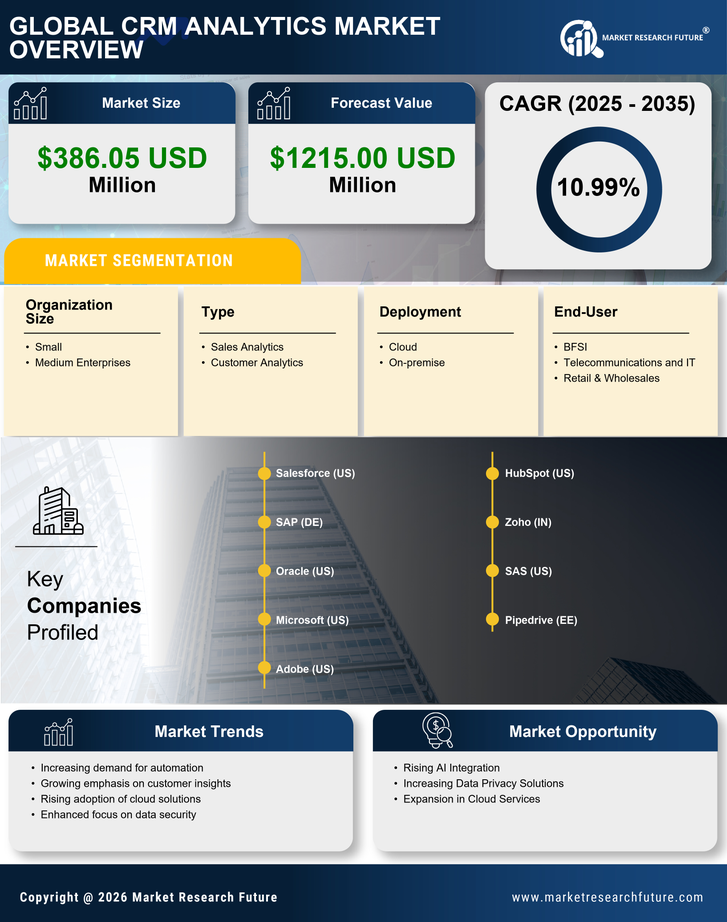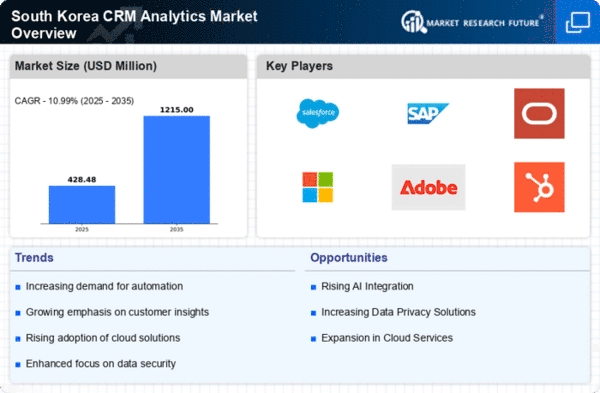Advancements in Predictive Analytics
The crm analytics market in South Korea is experiencing advancements in predictive analytics technologies. Businesses are increasingly leveraging predictive models to forecast customer behavior and trends, enabling proactive decision-making. By 2025, it is anticipated that the adoption of predictive analytics tools will increase by 25%, as organizations seek to enhance their marketing effectiveness and operational efficiency. These tools allow companies to anticipate customer needs and tailor their offerings accordingly, thereby improving customer satisfaction and loyalty. The integration of predictive analytics into crm systems is likely to transform how businesses interact with customers, making the crm analytics market a focal point for innovation and growth.
Integration of Cloud-Based Solutions
The crm analytics market in South Korea is witnessing a significant shift towards cloud-based solutions. Organizations are increasingly adopting cloud technologies to enhance their analytics capabilities, allowing for greater flexibility and scalability. By 2025, it is estimated that over 60% of businesses will utilize cloud-based crm analytics tools, facilitating real-time data access and collaboration. This transition not only reduces infrastructure costs but also enables companies to leverage advanced analytics features without substantial upfront investments. The integration of cloud solutions is expected to drive innovation within the crm analytics market, as firms can quickly adapt to changing market dynamics and customer needs. Consequently, the demand for cloud-based analytics platforms is likely to continue its upward trajectory.
Rising Demand for Data-Driven Insights
The crm analytics market in South Korea experiences a notable surge in demand for data-driven insights. Businesses increasingly recognize the value of leveraging customer data to inform strategic decisions. In 2025, the market is projected to grow by approximately 15%, driven by the need for enhanced customer segmentation and targeted marketing strategies. Companies are investing in advanced analytics tools to extract actionable insights from vast datasets, enabling them to tailor their offerings to meet customer preferences. This trend reflects a broader shift towards data-centric business models, where organizations prioritize analytics capabilities to gain a competitive edge. As a result, the crm analytics market is likely to expand, with firms seeking innovative solutions to harness the power of data effectively.
Regulatory Compliance and Data Governance
The crm analytics market in South Korea is significantly influenced by regulatory compliance and data governance requirements. As data privacy regulations become more stringent, businesses are compelled to adopt analytics solutions that ensure compliance with legal standards. By 2025, it is expected that 70% of companies will prioritize data governance in their analytics strategies. This focus on compliance not only mitigates risks associated with data breaches but also enhances customer trust. Consequently, the demand for crm analytics tools that incorporate robust data governance features is likely to rise. This trend underscores the importance of aligning analytics capabilities with regulatory frameworks, positioning the crm analytics market as a critical component of responsible data management.
Growing Emphasis on Customer Retention Strategies
In the crm analytics market, there is a growing emphasis on customer retention strategies among South Korean businesses. Companies are increasingly aware that retaining existing customers is often more cost-effective than acquiring new ones. As a result, investments in analytics tools that focus on customer behavior and satisfaction are on the rise. By 2025, it is projected that the market for customer retention analytics will grow by 20%, as firms seek to understand customer journeys and identify potential churn risks. This trend highlights the importance of utilizing crm analytics to foster long-term relationships with customers, ultimately driving revenue growth. The crm analytics market is thus positioned to benefit from this shift towards retention-focused strategies.

















